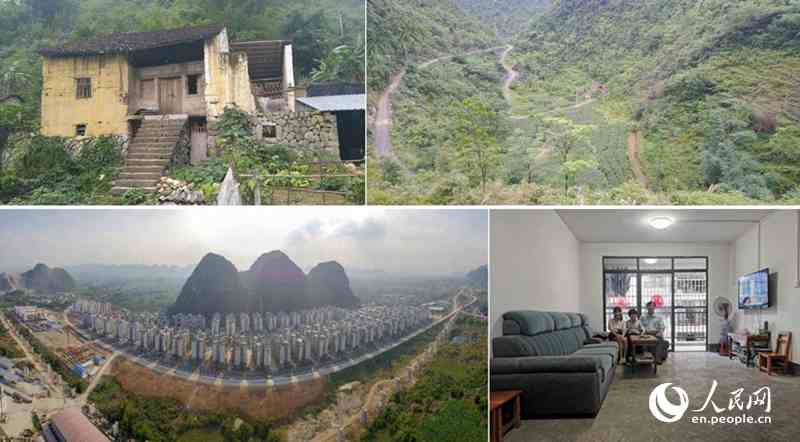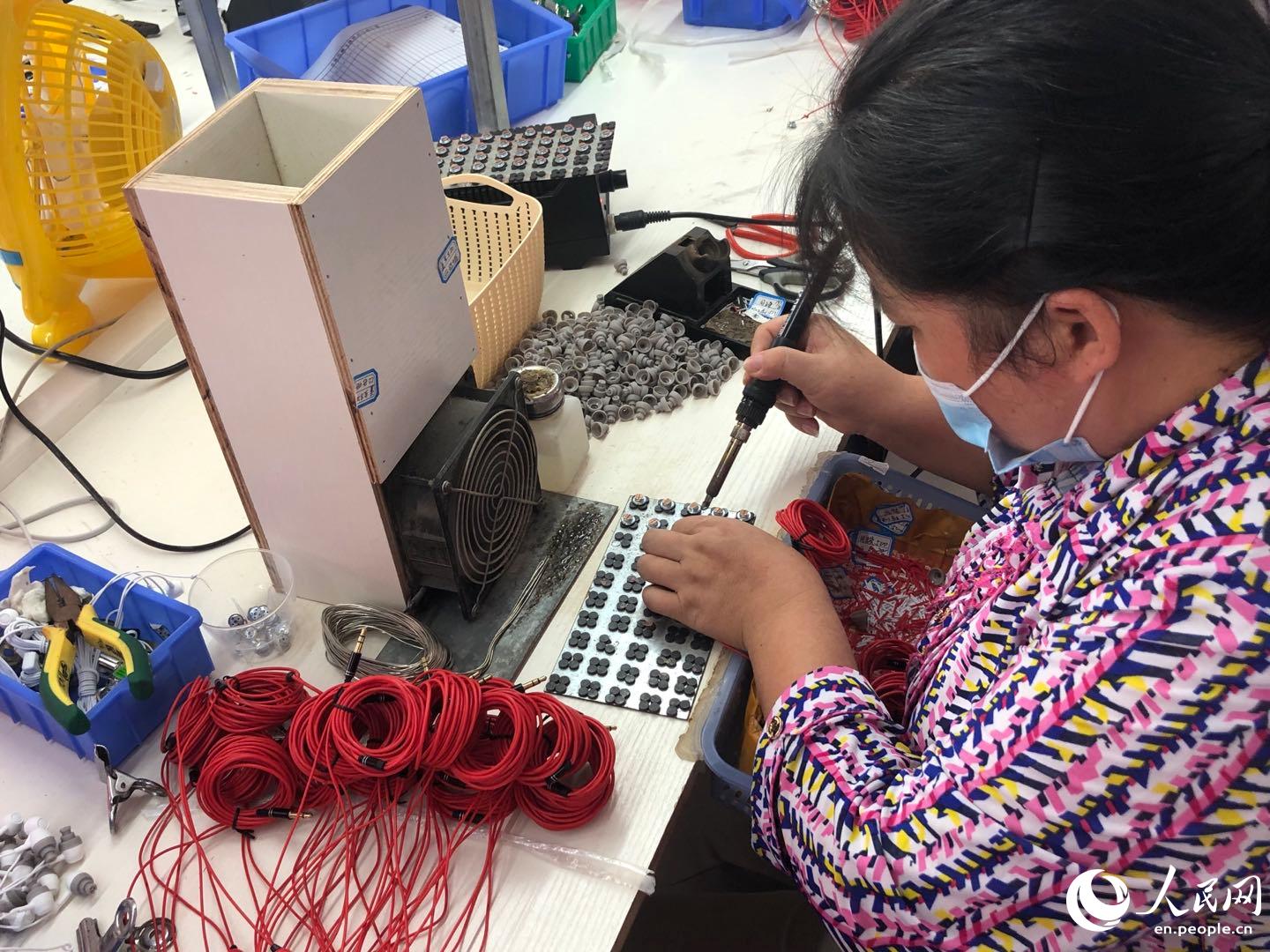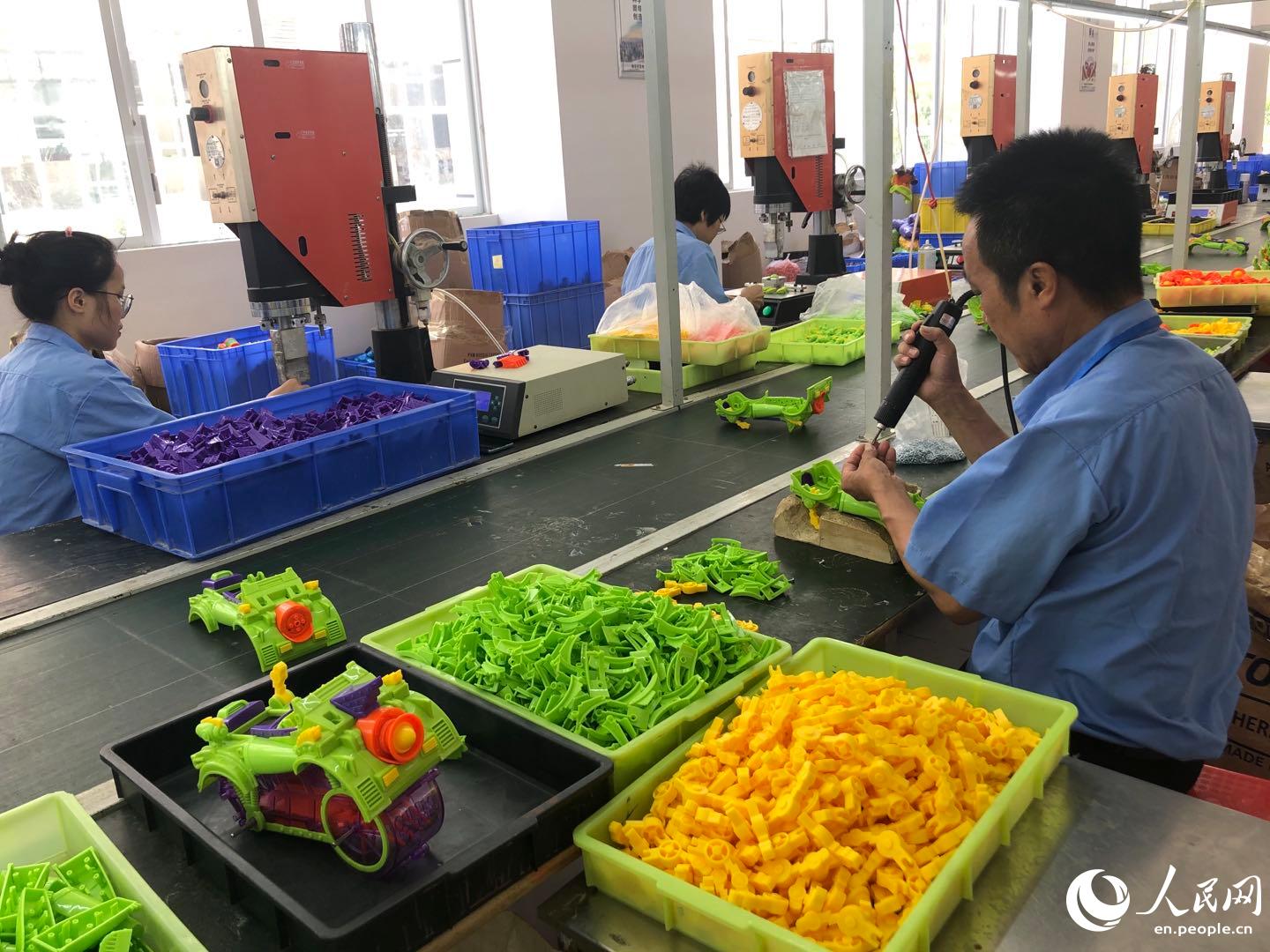

Wei Biao beams with satisfaction as he stands in his 93-square-meter apartment, complete with elevator. He never dared to dream that one day his family could move from the village deep in the mountains and own a new home in a suburban area close to the county.
The family of four used to live in a mud-tiled house in the heart of the karst mountainous area in Du’an Yao Autonomous County, south China’s Guangxi Zhuang Autonomous Region, one of the most beautiful, but also inaccessible, parts of the country.
In October 2017, Wei’s family moved to Baxian new area, a poverty-relief resettlement site in Xianlang community, Chengjiang Township of Du’an, to begin a new life.
Wei is one example of the many people who have relocated from the country’s inhospitable areas. China has taken a series of measures to ensure that its poverty eradication target is reached and the building of a moderately prosperous society in all aspects is completed. The relocation project is part of the country’s efforts.

Combo photo shows Wei Biao’s former residence deep in the mountains (top, file photo), and a view of the Baxian poverty-relief resettlement site where Wei lives (bottom) in Chengjiang Township of Du’an Yao Autonomous County, south China's Guangxi Zhuang Autonomous Region. (Photo provided to People’s Daily Online)
A new home
At the end of 2015, China vowed to spend 600 billion yuan ($89.1 billion) over the following five years to relocate about 10 million impoverished people. The campaign has brought dramatic changes to China's rural areas.
Guangxi, a key region in China's anti-poverty efforts, has made identifying and setting up files for about 710,000 people relocated from inhospitable areas during the 13th Five-year Plan period (2016-2020) as a key battle against poverty. In Du’an county, a total of 46,747 people have been relocated, of whom 45,081 are from impoverished households.
"We are so grateful that we can move to new homes, and almost all the construction costs are covered by government subsidies," Wei said, pointing out that his family only paid 10,000 yuan ($1,500) for their new home.
"My new home is spacious and bright! My two daughters can go to the elementary school nearby. The transportation here is convenient. It takes less than 20 minutes to get to the county center by bus,” Wei told People’s Daily Online.

Photo taken on August 22, 2020 shows a view of the Baxian poverty-relief resettlement site in Chengjiang Township of Du’an Yao Autonomous County, south China's Guangxi Zhuang Autonomous Region. (People’s Daily Online/Du Mingming)
Baxian is the largest poverty-relief resettlement site in Du'an county. It covers an area of 203 acres, has a total investment of 1.23 billion yuan, and has seen the construction of 64 apartment buildings with 4,960 sets of resettlements.
A total of 4,672 households and 20,003 people from 200 villages in 18 townships across the county have been relocated and resettled here. The resettlement has all sorts of facilities such as tap water, electricity, roads, communication infrastructure and Internet.
A hospital, schools, supermarkets, public entertainment facilities and other services such as postal, banking and telecommunications offices have been put into operation in the community, realizing full coverage of public services for relocated people so that they can enjoy the convenience of a "10-minute service circle".
While lifting people out of poverty was the first step, efforts are also being made to ensure that the relocated residents can settle in properly, find jobs and lead better lives.
Access to better jobs
Relocation is no easy matter for the local government, as officials have to consider how to help relocated people find jobs to eventually shake off poverty.
Du’an county has been plagued by karst rocky desertification. Like many local villagers, Wei and his wife used to make a merger living by growing corn in the stony mountains. In his spare time, Wei also made money by delivering goods along the mountain roads.
Despite working hard, life for the family was a major struggle, but things are different now. Wei has found a job as a security guard in the neighborhood, which guarantees a stable salary while allowing him to take care of the family at the same time.
Now that the community is becoming more vibrant, Wei has found a new business opportunity, and is preparing to set up a breakfast shop as a sideline.
“The monthly rent for a 12-square-meter shop is only 96 yuan. It won’t be a problem to pay, and I can earn some more money to support my family,” Wei said with confidence.
Wei’s wife works at a store in neighboring Guangdong Province, where she can regularly visit doctors to check on her health issues.
In addition, relocated households are able to enjoy other benefits such as low-income supplements, health and accident insurance, retirement pensions, education scholarship funds, and so on. According to related policies, Wei’s family is entitled to receive over 15,000 yuan in additional subsidies per year.
As the largest relocation site for poverty alleviation in Du'an, the Baxian new area has helped properly accommodate 18,000 poor households. An industrial park has also been built to bring employment for relocated people.

Photo taken on August 22, 2020 shows a female worker at an earphone factory at Baxian Industrial Park in Chengjiang Township of Du’an Yao Autonomous County, south China's Guangxi Zhuang Autonomous Region. (People’s Daily Online/Du Mingming)
With a total investment of 180 million yuan, Baxian industrial park will be constructed in three phases. Various industries such as electronics, hardware processing, manufacturing and auto parts will soon be introduced, and will be able to accommodate 20 to 30 labor-intensive production enterprises.
The first phase of the industrial park has been completed and put into operation. As of July 31, seven enterprises have been introduced, creating 520 jobs. 12 “poverty alleviation workshops” have recruited 1,494 people from relocated poor households.
According to Qin Xide, a local official, Xiangyun Electronics Factory and Leyi Electronic Toys Factory in the industrial park have employed over 400 residents from the community, of whom more than half are from poor households.
After the completion of the third phase of the project, it is estimated that an additional 4,000 to 6,000 people will find jobs, and the per capita monthly income of poor households is expected to top 3,000 yuan.
The county also helps relocated residents to engage in flexible work, such as hand-weaving for company orders or seeking opportunities away from home, basically achieving the goal of “one household, one person with a stable job”.

Photo taken on August 22, 2020 shows workers at an electronic toys factory at Baxian Industrial Park in Chengjiang Township of Du’an Yao Autonomous County, south China's Guangxi Zhuang Autonomous Region. (People’s Daily Online/Du Mingming)
Zhu Xiaoling contributed to the story.

 Award-winning photos show poverty reduction achievements in NE China's Jilin province
Award-winning photos show poverty reduction achievements in NE China's Jilin province People dance to greet advent of New Year in Ameiqituo Town, Guizhou
People dance to greet advent of New Year in Ameiqituo Town, Guizhou Fire brigade in Shanghai holds group wedding
Fire brigade in Shanghai holds group wedding Tourists enjoy ice sculptures in Datan Town, north China
Tourists enjoy ice sculptures in Datan Town, north China Sunset scenery of Dayan Pagoda in Xi'an
Sunset scenery of Dayan Pagoda in Xi'an Tourists have fun at scenic spot in Nanlong Town, NW China
Tourists have fun at scenic spot in Nanlong Town, NW China Harbin attracts tourists by making best use of ice in winter
Harbin attracts tourists by making best use of ice in winter In pics: FIS Alpine Ski Women's World Cup Slalom
In pics: FIS Alpine Ski Women's World Cup Slalom Black-necked cranes rest at reservoir in Lhunzhub County, Lhasa
Black-necked cranes rest at reservoir in Lhunzhub County, Lhasa China's FAST telescope will be available to foreign scientists in April
China's FAST telescope will be available to foreign scientists in April